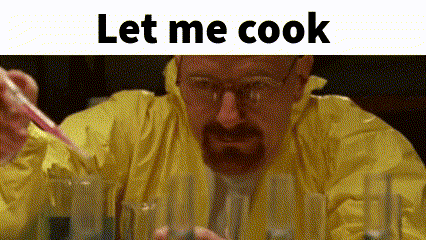Personally, I don’t* but I was curious what others think.
*some sandwiches excluded like a Cubano or chicken parm; those do require cooking.
I guess it would depend on the type of sandwich
. Peanut butter and jelly? No
A simple cheese sandwich? No
Grilled cheese sandwich? Yes
What about a grilled cheese and peanut butter and jelly and pickles sandwich with a side of sourkrout?
I’m going with inedible but yeah that’s cooking
peanut butter and jelly and pickles sandwich
this sounds like something my SiL would eat when she was pregnant.
also… what kind of pickles? I bet i could get my nephew and nieces to eat it, and they’d probably love it.
Vlassic! Obviously!
“Cooking” to me, requires the combination of ingredients AND heating them to create a new thing. Making a grilled cheese is basic, but cooking. Slapping meat, cheese and veg on bread is not cooking.
But what if you toast it?
Cooked
Is combining microwave rice and a frozen meal portion cooking then? Or to they have to be heated together?
You can cook in a microwave. But those frozen meals and rice packs are already cooked, you’re just reheating/reconstituting them. I wouldn’t conconsider that cooking, no.
Entirely context dependent.
Who’s cooking tonight? Me, and if it’s sandwiches, salad, etc - still counts.
No cooking in the room. Combining sliced bread with sliced cheese out of the bag - doesn’t count.
IMO, assembling a sandwich from ready-to-eat ingredients without using a stove, oven, microwave, etc. is meal prep, not cooking. If you roast, saute, toast, smoke, or even zap any part of it, now you’re cookin’. (Though zapping might just be reheating something that was cooked previously. Ugh, this is more complicated than it should be. English can be frustrating.)
Personally I’d define cooking as something that creates an irreversible physical or chemical change using heat.
It’s only cooking if it’s done in the Cooke region governed by the Earle of Sandwich. Anything else is sparkling food preparation.
The specific language you speak has significant impact here. For some, "to make food* is used to refer to cooking. Where as in English it’s not so clear. I prefer the use in terms of survival. IMO, if you can make any food enough to survive you can cook, because in English there is not a better colloquial verb. Though i wouldn’t call you ‘a cook’ or ‘a chef’ if you can’t apply heat to produce edible food from raw.
This might be different depending on the speaker, but at least for me Portuguese and Italian are even stricter on interpreting cozinhar/cozer and cucinare/cuocere as involving heat. Like, if I were to say for example ⟨*cozinhei um sanduíche⟩ (literally “I *cooked a sandwich”), I’m almost sure that people would interpret it as “I picked an already prepared sandwich and used it as ingredient for something else”
I mean that’s true of the english term as well. But if someone says they can’t cook i default to thinking they order out every meal or use a microwave fot cup of ramen. Making sandwiches, salads, and other cold foods is still a skill but there’s no word such as cold-cutlerist and i refuse andwich artist.
Perhaps I’m overthinking it, but the English verb seems to have different meanings when it’s used transitive and intransitively. For example, let’s say that you ask someone to prepare you a salad, and the person answers:
- “I can’t cook.” (sounds OK?)
- “I can’t cook a salad.” (sounds weird)
I think that’s grammatically true but i tend to think of it more in terms of colloquialisms or slang. I imagine intransitive use of the verb developed out of convenience for lack of a lazy alternative. “I can’t prepare food” would either suggest you require assistance to eat, you can’t legally work at a restaurant, or your aristocratic status is beyond that of a mere peasant who has seen a kitchen before.
Cooking is a process of transformation, both physical and symbolic. Combining ingredients intentionally to create something flavorful and nutritious, making a sandwich certainly falls under the act of cooking.
I don’t think it’s cooking unless you are applying heat to cause a chemical reaction. So, making a grilled cheese sandwich counts as cooking, but a BP&J does not.
Beenut putter?
Lol whoops. I’m leaving it.
Butter, peanutbutter and jelly?
Butter, Peanut butter, and Just a little more peanut butter
Making ceviche or sushi officially not cooking confirmed - how dare those posers call themselves sushi chefs.
Some of the constituent ingredients have to be cooked, but ceviches and sushi rolls aren’t cooked any more than salads or burritos. They’re assembled or prepared.
You’re ignoring the chemical process in ceviche.
Yea, ceviche is cooked with acid rather than heat - you can also cook some foods with salt!
You could cook using an exothermic reaction between ingredients, but I don’t think that’s what’s happening when making ceviche, so a ceviche is not cooked.
The proteins are being chemically denatured.
By heat?
The acid from the lime is doing the cooking in ceviche.
I agree - and it specifically isn’t doing so through an application of heat.
gotta cook the rice for sushi. checkmate.
Sashimi: do I not even exist, bro?
Ha, you actually believe in Sashimi? Crazy.
Slap a whole fish down in front of you.
You: “Not cooked”
slice fillet of fish off and present it.
You: “Not cooked”
slice fillet into small bite size pieces and squirt some neon green horseradish next to it
You: “Dis is cooked!”
?
Yea, it looks fucking delicious. Thank you for cooking me a fine meal!
What if I want my raw spam musubi extra crunchy?
Then you should opt the spam out for soused harring.
I think of a chef as a “preparer of food” not necessarily “food cooker”
So sushi chef is still accurate to their opinion, disclaimer I agree with them so I could always be rationalizing it.
chef is french for chief. they are the head of the kitchen.
They still have to cook the rice.
Ceviche is said to be “cooked” with acid, even if that’s not the most accurate term. And most forms of sushi are made with cooked rice, at minimum, and not uncommonly with other cooked ingredients. So those things kind of muddy the waters for your point. But a clearer example may be something like beef tartare, a garden salad with a vinegarette, or sashimi. Those things are “prepared”, not cooked, because no cooking is involved in their making. Cooking is specifically the preparation of food utilizing heat. Chefs prepare plenty of dishes that do not involve the act of cooking.
Just because it’s preparing food and not cooking doesn’t mean that it is lesser.
What if I microwave it?
You can cook with a microwave, but if you’re just reheating something that’s not cooking.
deleted by creator
Maybe a panini.
True, but, turn that into ‘I’m cooking up a sandwich’, and now the phrase potentially expands its domain to basically mean any kind of food preparation.
The addition if ‘up’ makes it less literal, more jovial and less bounded.
True, but, turn that into ‘I’m cooking up a sandwich’, and now the phrase potentially expands its domain to basically mean any kind of food preparation.
The phrase expands into any preparation or invention, even ones that clearly do not have anything to do with cooking. e.g. “I’m cooking up a plan to deal with this.”
Ehhh food preparation more than cooking. You’re just assembling things. I’m a pro at a good sandwich if I do say so myself. Sometimes I have to cook to make that happen. But a basic sandwich…nah, no cooking involved.
No, it’s food preparation but nothing is being cooked.
Depends on your start point. You can bake your own bread, cook/combine your own condiments, and roast/cure your own meats.
You can grow your wheat, and raise pigs, but to really make it from scratch, first you need to create the universe.
Only if you say sudo.
hm, no, because it is baking instead.
Care to elaborate? Other than toasting it, how do you consider it baking?
the bread is the lynch pin of the sandwich. You can do whatever you want with the rest of the ingredients, but the bread must (usually) be baked.
Fair enough. Do you still consider it baking if your bread comes in a bag from the grocery store?
By that logic, salads and sushi aren’t cooking.
Correct.
I wouldn’t say that they are cooking. They are preparing food.
Depends on the sandwich. If you’re constructing a sandwich without using heat, I would consider that “making lunch” or “making dinner” but not explicitly cooking. I’m not sure that the difference matters in any significant situations, though. Why are you asking?
Why are you asking?
Boredom.





















